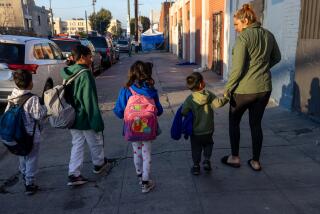Judge Gives Homeless a Break on Food Stamps
Homeless families who get money from a special California program that helps them find housing will no longer have to count that money as income against their federal food stamp allowance, a federal judge in Sacramento ruled Friday.
The judge’s preliminary order restores monthly food stamp benefits to about 5,000 homeless families statewide, according to a legal aid attorney who filed suit on behalf of the families.
About $5 million in food stamps have been cut off by the U.S. Department of Agriculture since the California program went into effect Feb. 1, the legal aid attorney said. In their lawsuit, the families argued that state shelter stipends should be regarded as one-shot, lump sum payments--which traditionally have been exempt from the USDA’s policy of counting all public assistance as income to be considered in calculating food stamp benefits.
Homeless Aid Program
U.S. District Judge Edward Garcia’s ruling allows shelter stipends to be covered by the exemption.
The stipends are issued by the state’s Homeless Aid Program, a $40-million project approved last September.
Under the program, homeless families receive $30 a night for about a month to pay for temporary shelter while they look for permanent housing. When they do find a place to stay, the state covers move-in costs, including security deposit, last month’s rent and utility deposits where needed.
“What California was giving homeless families with one hand, the federal government was taking away with the other,” said Melinda Bird of the Western Center for Law and Poverty, one of five legal-service agencies that brought the case.
“If you count these benefits as income, it looks like the families have had a tremendous spurt of income for one month, when in fact none of these payments are available for food. They all are earmarked for emergency shelter costs or move-in costs,” she said.
Average Grant
The average family’s food stamp grant is $150 per month, Bird said. “Cutting off food stamps forces them either to watch their children go hungry or to use rent money for food, which puts them at risk of becoming homeless again.”
Bird called the USDA’s policy of including housing payments as income an “arbitrary” one.
“They don’t apply the rule consistently,” Bird said. “In three states (with programs similar to California’s)--Hawaii, Massachusetts and New York--it is not counted as income. The USDA had a longstanding policy of how they define lump sums. And they just applied the definition in an insensitive way.”
But the attorney representing the USDA said the agency simply needs more time to review its policy.
“In determining whether they are taking a consistent approach, we have to look clearly and closely at every state’s (welfare) program,” said Assistant U.S. Atty. Karen Patterson. “States have very different programs and the analysis could be different. We have to look at how the benefits fit into the whole state scheme.”
The USDA and the California Department of Social Services filed a statement of non-opposition to the preliminary injunction on July 1.
“By not opposing these motions, the agency is not taking any position on the merits of the lawsuit,” Patterson said.
Patterson added that it is not unusual for the government to agree to short-term relief in order to allow both sides time to research an issue. Judge Garcia’s preliminary order will stand until he makes a final ruling within the coming months.
Kathleen Norris, a California Department of Social Services spokeswoman, said the preliminary injunction is under review by department attorneys. “We need some time to assess what impact it might have and to make any decision on the matter.”
The impact of the preliminary ruling on individual families may be significant.
“I already had to spend some of the money I needed for my June rent on food,” Monica Hamilton, a Los Angeles homeless mother of three, said in court papers. “I don’t want to fall behind just when I’m starting out. . . . Do they want me to become homeless again?”
More to Read
Sign up for Essential California
The most important California stories and recommendations in your inbox every morning.
You may occasionally receive promotional content from the Los Angeles Times.









